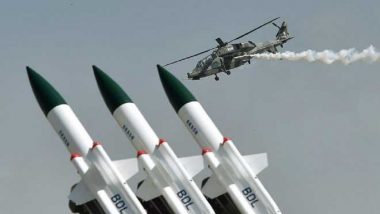Moscow, November 26: A senior Russian diplomat warned Monday that the planned US withdrawal from a Cold War-era arms control pact could critically upset stability in Europe.
Deputy Foreign Minister Sergei Ryabkov said Monday that if the US deploys intermediate-range missiles in Europe after opting out of the treaty banning their use, it will allow Washington to reach targets deep inside Russia.
US President Donald Trump declared his intention last month to withdraw from the 1987 Intermediate-Range Nuclear Forces (INF) Treaty over alleged Russian violations. Moscow has denied breaching the pact and accused Washington of violating it. U.S. Threatens to 'Take out' Russian Missiles As it Alleges Moscow Violating Nuclear Treaty.
Ryabkov warned that if the US stations the currently banned missiles in Europe, Russia will have to mount an "efficient response." He didn't elaborate.
"We won't be able to turn a blind eye to the potential deployment of new US missiles on the territories where they may threaten Russia," he said, adding that such intermediate-range missiles would tilt the existing strategic balance between Russia and the US "We would very much want not to get to the point of new missile crises.
No one will benefit from those developments." Russian President Vladimir Putin has warned that if the US deploys intermediate-range missiles in Europe, Russia will have to target the nations that would host them.
Last week, a senior Russian lawmaker warned that Moscow also could respond by stationing its missiles on the territory of its allies. Ryabkov said that modern weapons technologies would make such US deployment even more destabilising than the positioning of US and Soviet intermediate-range missiles in Europe in the early 1980s.
Such weapons were seen as particularly dangerous since they take only a few minutes to reach their targets, leaving little time for political leaders to ponder a response and raising the threat of a nuclear war in case of a false attack warning.
The INF Treaty, signed by US President Ronald Reagan and Soviet leader Mikhail Gorbachev, was touted as a major boost to global stability, helping end the Cold War. The pact prohibited the US and Russia from possessing, producing or test-flying ground-launched nuclear cruise and ballistic missiles with a range of 500 to 5,500 kilometers (300 to 3,400 miles).
The US has claimed that Russia violated the pact by testing and deploying a new ground-based cruise missile with a range exceeding 500 kilometers. Ryabkov charged that while Moscow and Washington have been talking about the issue for five years, the US long refrained from detailing its complaints and only spelled them out a month ago. He added that the US declared its intention to bail out of the treaty without waiting for a Russian answer.
"It was yet another proof that our transparency has no effect on decisions made in Washington, they made up their mind long time ago and were just waiting for Russia to admit its guilt," Ryabkov said.
The diplomat insisted that the missile the US said was a breach of the treaty, 9M729, never has been tested for the range outlawed by the pact. He noted that Russia has provided a detailed explanation showing that the missile's design doesn't allow fitting additional fuel tanks to extend its range and also offered details on the vehicle serving as its mount.
"It's hard to say what the US accusations were based on," Ryabkov said.
"It's possible that intelligence data were eagerly tweaked to serve a political order, or it could be that intelligence structures just made wrong assessments."













 Quickly
Quickly











